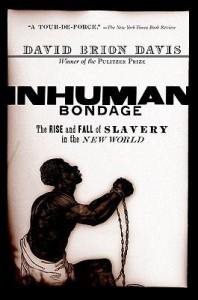If you want to better understand how all of us came to hold the conviction that slavery is wrong, you might consider the following claim:
“The abolition of New World slavery depended on large measure on a major transformation in moral perception—on the emergence of writers, speakers, and reformers, beginning in the mid-eighteenth century, who were willing to condemn an institution that had been sanctioned for thousands of years and who also strove endlessly to make human society something more than an endless contest of greed and power.
David Brion Davis, Inhuman Bondage, p. 1.
That is quite a claim, when one thinks about it. How often do unjust institutions get struck down, particularly if those institutions have existed for all of human history and could be found in every region of the world?
I am a historian, so I will give you an authoritative answer: not often.
For many reasons, then, I think we would all benefit from greater understanding of this historical development. And so, as a little post-game wrap up to my contest between James Bond and Samuel Sharpe, I’d like to recommend a book. Like millions of others, you can entertain yourself by watching the new James Bond movie, which is fine, but you should also consider the riches of a historical work that deepens your understanding of the world and how it works.
The book, by David Brion Davis, is Inhuman Bondage: The Rise and Fall of Slavery in the New World. After a career of extensive and thoughtful study of slavery, Davis wrote this book to explain how slavery came to dominate the Americas and then how it was eventually abolished. The story is complicated, but Davis condenses a mountain of historical scholarship into a quite readable form, which is one of the reasons that it won the Pulitzer Prize.
 Part of the reason why I find this story compelling is because I believe that the hand of God was behind the abolition of slavery. Davis does not mention the hand of God in the book. I do not know what Davis’ religious convictions are and I am guessing that he would not agree with my claim that I can see God at work. As a rule, academic historians do not try to determine if God is at work in history. Academic historians do give careful consideration to the human forces that lead to historical change and Davis, who is an excellent historian, does that quite well.
Part of the reason why I find this story compelling is because I believe that the hand of God was behind the abolition of slavery. Davis does not mention the hand of God in the book. I do not know what Davis’ religious convictions are and I am guessing that he would not agree with my claim that I can see God at work. As a rule, academic historians do not try to determine if God is at work in history. Academic historians do give careful consideration to the human forces that lead to historical change and Davis, who is an excellent historian, does that quite well.
I plan to discuss more of this later. For now, I would think you might find it interesting to read this book with a couple of questions in mind: was God at work in this movement? And if so, how?
Oh, and if you are ever in Jamaica, ask your van driver to tell you about Samuel Sharpe. I am sure that he or she would be very pleased to tell you about him.

Pingback: Beryl Santaana
Pingback: Sena Castera
Pingback: Kyle Bermel
Pingback: Dick Kint
Pingback: Luciano Hazelbush
Pingback: Keenan Calderon
Pingback: Berneice Scherf
Pingback: Harry Favorito
Pingback: Loni Peszynski
Pingback: Haywood Marvray
Pingback: Lenny Merickel
Pingback: Wilburn Sisti
Pingback: Chauncey Fuerte